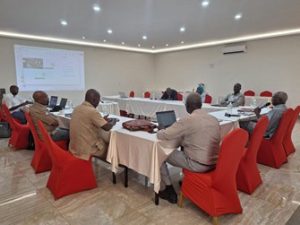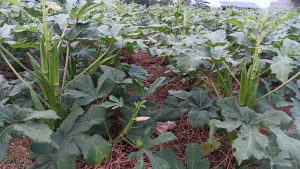South Sudan: TAAT facilitates workshop on Strengthening Emergency Preparedness and Response to Food Crisis

South Sudan faces challenges in agricultural productivity due to limited access to climate-resilient seed varieties and inadequate irrigation practices. The need to address these limitations necessitated a three-day workshop to bolster the country’s seed sector.
Organized by the Directorate of Agricultural Research at the Ministry of Agriculture and Food Security (MAFS) South Sudan in collaboration with the Technologies for African Agricultural Transformation (TAAT), the International Institute of Tropical Agriculture (IITA), the International Crops Research Institute for the Semi-Arid Tropics (ICRISAT) and the African Agricultural Technology Foundation (AATF) the event brought together research technicians, seed technologists, and private seed company representatives.
The training workshop, which held in Juba, South Sudan, from May 21st to 23rd, 2024 within the framework of the Strengthening Emergency Preparedness and Response to Food Crisis (SEPAREF) Project, equipped participants with the knowledge and skills needed to conduct seed testing to ensure seed quality and health; manage field experiments effectively, including site selection, planting, and data collection; understand foundation seed production models; and Establish Public-Private Partnerships (PPPs) for efficient seed production.
The workshop commenced with an opening ceremony chaired by Prof. Matthew Gordon Udo, the MAF’s Under-Secretary. Luka Atwok, on behalf of the Director of Agricultural Research, George Tadu, delivered welcome remarks.
The Director expressed gratitude to the TAAT and its Capacity Development and Technology Outreach Compact and emphasised the importance of increasing agricultural productivity and building NARES’ capacity to achieve food security, job creation, and improved livelihoods.
Maurice Mogga, the FAO Representative, highlighted the partnership between TAAT, FAO, and MAFS, and the importance of the Strengthening Emergency Preparedness and Response to Food Crisis (SEPAREF) Project in enhancing Early Generation Seed (EGS) production and supporting the training of relevant staff.
Prof. Matthew Udo stressed the role of agriculture in South Sudan’s GDP and the need for technologies to enhance its contribution. He encouraged staff to apply the knowledge gained from the training and collaborate with local universities.
The key training areas included Seed testing procedures (purity, germination, health), Experimental field design and management, Seedbed preparation and planting techniques, Foundation seed production models and PPPs development, and Seed quality considerations and inspection procedures.
The training was structured around presentations on the assigned topics for each focus group, covering all the outlined objectives. The schedule was divided into three technical sessions over the three days.
The first day of the workshop concentrated on equipping MAFS Seed Technologists with essential knowledge and skills related to seed testing and plant health.
This encompassed definitions and concepts of seed quality, viability, and pathology. It also covered the purposes and procedures involved in seed health testing, various methods of seed testing such as physical purity and germination tests, and different seed health testing methodologies.
Additionally, participants learned about proper seed packaging and storage techniques to ensure seed quality and longevity.
On the second day, the focus shifted to training Research Technicians on the intricacies of field experimentation and trial management. The sessions included guidance on selecting appropriate experimental sites and preparing seeds.
Participants were taught how to prepare seedbeds, understand the characteristics of good seed plots, and implement various experimental designs and trial field layouts.
They also learned about agronomic best practices, effective trial management strategies, and the importance of meticulous data collection, recording, and management.
The final day was dedicated to senior scientists and staff from the Directorate of Agricultural Research and private seed companies, concentrating on foundation seed production and fostering public-private partnerships (PPPs).
The training provided insights into different foundation seed production models and how to create synergies between the public and private sectors. Topics included seed preparation, key quality factors, seed certification, and inspection processes.
The sessions also addressed developing a national seed policy and regulatory framework, which is crucial for establishing a robust and sustainable seed system in South Sudan.
Participants noted several key points, including the absence of a seed policy and certification organisation in South Sudan, the involvement of various international finance institutions in seed system development, and the need for a ministerial order to guide seed business. They also highlighted the EU and FAO’s ongoing efforts in seed policy development.
The workshop highlighted the need for a collaborative approach to strengthen South Sudan’s seed sector.
Key recommendations include establishing a national seed policy and regulatory framework; fostering PPPs for foundation seed supply; and Convening high-level stakeholder meetings to discuss seed policy roadmap for major commodities and roadmap development in consultation with FAO, the World Bank and other partners of Strengthening Emergency Preparedness and Response to Food Crisis (SEPAREF) and Resilient Agricultural Livelihoods in Somalia (RALP) Projects.
This TAAT-facilitated training workshop is a significant step towards building a more robust seed system in South Sudan. By equipping key actors with the necessary skills and fostering collaboration, the initiative enhances the country’s agricultural productivity and food security.
Recent Stories
Related Stories
- South Sudan: TAAT holds High-level Consultative Workshop on Food Systems Transformation
- South Sudan: TAAT strengthens the varietal release system
- How TAAT is cultivating hope and uniting for Agricultural Transformation in South Sudan
- Tanzania: TAAT and partners Showcase Scalable Solutions for Africa’s Grain Challenges
- TAAT spearheads new drive to unlock South Sudan’s agricultural potential





